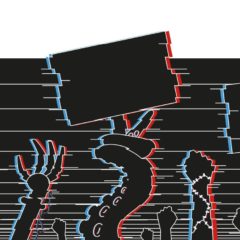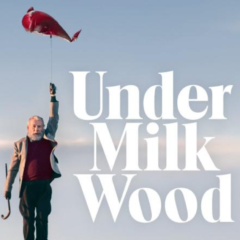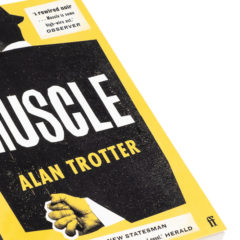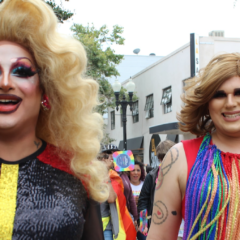Writing Across Worlds
Writing Across Worlds: In Converation with Victor Fernando R. Ocampo When: 28 April 2023, 12:00 — 13:20 Venue: Online Book your place Conversation with prolific Singapore-based Filipino writer Victor Fernando R. Ocampo, on his International Rubery Book Award shortlisted collection The Infinite Library and Other Stories, his influences and writing craft, and the state of speculative fiction in Southeast Asia today. Join us in conversation with prolific Singapore-based Filipino writer Victor Fernando R. Ocampo, on his International Rubery Book Award shortlisted collection The Infinite Library and Other Stories, his influences and writing craft, and the state of speculative fiction in Southeast Asia today. This discussion is hosted online and will be moderated by Malaysian editor and writer Zhui Ning Chang. Victor Fernando R. Ocampo is the author of the International Rubery Book Award shortlisted The Infinite Library and Other Stories (Math Paper Press, 2017; Gaudy Boy, 2021) and Here be Dragons (CANVAS Press, 2015), which won the Romeo Forbes Children’s Story Award in 2012. His writing has appeared in many publications including Apex Magazine, Daily Science Fiction, Future Fiction, Likhaan Journal, Strange Horizons, Philippines Graphic, Science Fiction World and The Quarterly Literature Review of Singapore, as well as anthologies like The Best New Singapore Short Stories, Fish Eats Lion: New Singaporean Speculative Fiction, LONTAR: The Journal of Southeast Asian Speculative Fiction, the Philippine Speculative Fiction series and Mapping New Stars: A Sourcebook on Philippine Speculative Fiction. He is a fellow of the Milford Science Fiction Writers’ Conference and a Jalan Besar writer-in-residence at Sing Lit Station (2020/2021). Zhui Ning Chang is a Malaysian editor, writer, and theatre practitioner based in London, UK. She serves as Fiction Editor at khōréō magazine, and is a co-editor on the Best of Malaysian Short Fiction in English 2010-2020 anthology. Her writing for performance includes queer romcom Seashore Yuanfen and time travel project Asian Pirate Musical; her essays and reviews have appeared in Strange Horizons, The BSFA Review, Library Journal, Fantasy/Animation, and more. Currently, she is a PhD researcher in transnational Southeast Asian speculative literature at Birkbeck, University of London. Featured image generated using...
SF & Extraction Conference CFP
SF & Extraction: LSFRC 6th annual conference 8-9 October 2022, Online Keynote speakers & Guest creators TBC. We're delighted to be supporting the 6th annual conference of the London Science Fiction Research Community, which returns in October 2022 as an international, two-day online event. Situating Extraction As Earth burns, capital continues to plunder more and more material with which to fuel its own destructive growth. ‘Extraction’ entails the removal – usually forcible – and conversion of the human and inhuman into marketable materials. In so doing, nature as such becomes implicated in human politics across a variety of tangled, exploitative confluences. Extraction is an imperialist, (neo)colonialist practice that has been wreaking havoc on life for over five hundred years, as resources and people are extracted from the Global South and profit accumulated in the Global North. It undergirds capitalism’s model of success-through-progress, occupying and controlling the horizons of past history, present conditions and future possibility. Extraction, then, insists that alternative ways of being-in-the-world do not matter, excluding, exploiting and destroying lives in order to keep the engines of eternal growth burning brightly. For the past two centuries, extraction has built a world petroculture, a global energy system that has caused disastrous damage to the planet’s climate and circumscribed social and cultural imaginaries. It is imperative that we find ways to conceive of futures free of extractive hegemony and the technofix solutions it proposes to the problems it causes. Sf builds new worlds, sometimes from the same components that constitute our present reality, sometimes with alternative ingredients and values toward more just and equitable ways of being. Its origins as a genre are colonialist and imperial, and its close affinity for the dominant technoculture remains ongoing. In spite of this – or, rather, precisely because of this – sf is uniquely effective as a mode of imagining capable of destabilising the binaristic divisions (nature/culture, first nature/second nature, centre/periphery) that underscore extractive thinking and practice. Sf has often been a genre of technical and personal mastery, but is increasingly a space for vulnerability, inclusion and change, of finding ways out of the historical nightmare that is being differentially forced upon us. The SF + Extraction Conference For our 2022 conference, the LSFRC welcomes submissions that explore the theme of Science Fiction + Extraction. We invite proposals for papers, panels, workshops, performances, and creative responses to the theme, and we would like to actively encourage alternative and innovative forms of presentation and engagement. It is our view that the theme of Extraction is urgent and at the same time broad and receptive to diverse interpretations. We welcome contributions that think with,...
Activism and Resistance: LSFRC Conference
Artwork by Thomas Johnson. 9-11 September 2021, online Keynote Speakers: Grace Dillon, Radha D'Souza Guest Creators: Jeannette Ng, Rivers Solomon, Neon Yang In an age when Me Too, Black Lives Matter, Decolonise the Curriculum, Refugees Welcome, and movements for global solidarity with oppressed populations have become part of mainstream discourse, it is vital to re-examine the relationship between activism, resistance and the mass imagination vis-a-vis science fiction. As a genre dedicated to imagining alternatives, science fiction is an inherently radical space which allows for diverse explorations of dissent. It is, also, a space that has been rightfully critiqued for its historic inequities favouring white cishet men (as recently addressed by Jeanette Ng during the 2019 Hugo Awards among others). There needs to be reckoning with how precarious bodies engage in activism and resistance in the context of their material realities and restrictions. Therefore, we must deny universalising a single experience as “radical enough” and instead acknowledge how communities in the margins – queer, trans, disabled, neurodivergent, BIPOC, immigrants and refugees, religious minorities, indigenous populations, casualised workers, the homeless and unemployed – have specific ways of subverting and undermining the system, as well as specific stakes and reasons to do so. It is imperative to not only revisit how science fiction has been a space for activism and resistance, but also resist and challenge the genre’s shortcomings. For our 2021 conference, the LSFRC welcomes submissions that explore the theme of “Activism and Resistance.” We recognise the urgency of this theme and the broad ways in which it can be interpreted and applied. We welcome contributions that explore SF as the site of activism and resistance, critical reflections of activism and resistance against SF’s tradition so far, and broader contributions on the topics of activism and resistance. We are especially keen to welcome practitioners, activists, change-makers and dissidents who are working to create a more equitable world. We do not adhere to strict reading of the term SF; instead, we encourage a widening of the genre to highlight and uplift different voices and perspectives. We invite proposals for papers, panels, workshops, protest and disruption sessions, performances, installations, and creative responses to the theme, and we would like to actively encourage alternative and innovative forms of presentation and engagement. We are aware that academic conferences often have barriers to access and if you have any specific concerns, please do reach out, especially as the online format carries its own challenges (and benefits). We hope we can alleviate some of these concerns with the reassurance that paying for registration is...
Birkbeck Alumni Directing New Plays
We're delighted to share some good news about recent Bikrbeck alumni from our MFA Theatre Directing, directed by Rob Swain, Professor of Theatre Practice. Lyndsey Turner, who graduated in 2007, is directing Dylan Thomas' Under Milk Wood at the Oilver Theatre in the National Theatre. The Covid-secure live performances will run from 16 June – 24 July 2021. Lyndsey was the first woman to win the Olivier award for Best Director and is an associate director of the National Theatre. Info here: https://www.nationaltheatre.org.uk/shows/under-milk-wood Atri Banerjee, who graduated in 2018 and won The Stage Debut award for Directing in 2019, is directing a new production of Harm at the Bush Theatre. This new play by Bruntwood Prize award winner Phoebe Eclair-Powell (WINK, Fury) and starring Kelly Gough (Broadchurch, Marcella), is a thrilling and razor-sharp twisted comedy on the corrosive effects of social media and isolation. Running from 17 May – 26 June 2021, Harm is made possible thanks to the support of the Government’s Culture Recovery Fund. Info here: https://www.bushtheatre.co.uk/event/harm/ Diane Page, who is a graduate of Birkecbk's BA Theatre Studies and completed the MFA Theatre Directing in 2019, is co-directing Out West with the Lyric Hammersmith Theatre's Artistic Director, Rachel O'Riordan. Out West comprises the world premiere of three new short plays by three of the UK’s leading playwrights – Tanika Gupta, Simon Stephens and Roy Williams and runs from 18 June – 24 July 2021. All rooted in West London, the plays explore race, identity and our sense of place and purpose, presented together as a triple bill. Info here: https://lyric.co.uk/shows/out-west/ Jonathan O'Boyle, who graduated in 2013 and won awards for his production of the musical The Last Five Years, is directing the musical this September as it transfers to West End, having been presented at Southwark Playhouse in 2019. It will run at the Vaudeville Theatre from 23 September 2021 for a limited season. The production at Southwark Playhouse was nominated for eight Offie Awards and won two for Best Director and Best Musical Production. Oli Higginson was nominated for a Stage Debut Award for his performance as Jamie. Info here: https://britishtheatre.com/the-last-five-years-transfers-vaudeville-theatre-23-september-2021/ Congratulations to all of our Birkbeck alumni and we hope that the new productions run smoothly amid Covid restrictions! For more information about Birkbeck's MFA Theatre Directing, please visit the programme's homepage. For more information about the Birkbeck Centre for Contemporary Theatre, please visit the centre's...
Interactive Narrative Workshop
Interactive Narrative Workshop with Dr Alan Trotter & Dr Mark Blacklock (Arts Weeks 2021) Starts: 13 May 2021, 19:30 Finishes: 20 May 2021, 20:30 Venue: Online Book your place What is interactive digital narrative and what tools are available to writers? As part of Arts Weeks 2021, Birkbeck is running a series of two hands-on workshops, run by Dr Alan Trotter, author of Muscle (Faber, 2019) and All This Rotting, a digital story for phones, and Dr Mark Blacklock, Senior Lecturer at Birkbeck and the author of the novels Hinton (Granta, 2020) and I'm Jack (Granta, 2015). The workshops are suitable for beginners and will guide participants through first encounters with freely available software tools such as Twine, Twitter Bots Done Quick, and Telescopic Text, while also introducing the history and theory of digital narrative. These workshops are generously supported by the Experimental Collaborative Humanities Network. Places limited to 20 on a first-come, first-served basis. Attendees must be available for both workshops: 13 May 19.30 20 May 19.30 Booking one ticket gives you access to both workshops. The 20 May workshop features feedback on draft piece made by participants. Dr Alan Trotter wrote the novel Muscle (Faber, 2019). He studied Philosophy and English Literature at the University of Edinburgh as an undergraduate; he has a Creative Writing MLitt (distinction) and a PhD in English Literature, both from the University of Glasgow. His PhD included creative and critical writing (the dissertation was on what it called 'Body Texts': work in print and electronic literature, that makes unusual use of its form): it was supported by Arts and Humanities Research Council funding throughout, as well as with an AHRC-supported placement at the John W. Kluge Center at the Library of Congress in Washington D.C. His short fiction has been published by Somesuch Stories, Under the Influence, McSweeney’s Internet Tendency, and the Electronic Literature Collection, Volume 3. He has also published a digital story for phones called All This Rotting with Editions at Play (a collaboration between Google Play and the publisher Visual Editions). He has worked for publishers including Penguin, Vintage, Granta, and currently works at Canongate Books, and is writing two novellas. Dr Mark Blacklock is Senior Lecturer in Modern and Contemporary Literature at Birkbeck College, University of London, and a novelist. His most recent novel, Hinton (Granta, 2020), was longlisted for the Walter Scott Prize, and described in The Guardian as ‘a singular literary achievement.’ His first novel, I’m Jack, a fictionalised autobiography of Wearside Jack, was published by Granta in 2015 and optioned for a film that was never made. Mark’s monograph, The Emergence of the Fourth Dimension, a literary and cultural history of higher-dimensioned space, was published by Oxford University Press in 2018. The essay ‘Weirding the Void: Higher Spatial Form in Weird Fiction’...
Notes on Camp, 2020
Birkbeck PhD student Dickon Edwards recently gave a short talk on the relevance of camp to a number of recent literary and theoretical works published in 2020. Delivered as part of our biannual PhD Conference held on 17 December 2020, Dickon’s talk, titled “Notes on Camp, 2020,” considered different forms of camp performance, including cosplay, wearing masks, and drag as a strategy of healing. You can watch a recording of Dickon’s talk and PowerPoint below, or read the transcript underneath. Featured image by Bret Kavanaugh on Unsplash Notes on Camp 2020 At this time of year there is a tradition in the media to publish reviews of the 12 months just gone. The following talk represents my own survey of the year 2020, in terms of the new books and cultural events which appeared on the radar of my research. 1. Camp Modernism – definitions My research is on camp modernism. This can be thought of as the intersection between ‘Camp’, which is typically associated with exaggeration and irony, external surfaces, externalised behaviour, and is particularly associated with the history of homosexual subcultures. ‘Modernism’, meanwhile, is a label often associated with fragmentation, with depth, and with interiority. Until recently these two concepts were thought incompatible. So much so, that modernism has sometimes been thought of as a mainly heterosexual idea, because it doesn’t easily lend itself to camp. 2. Books of the Year There is certainly a hint of that theory in the title of one of my books of 2020. No Modernism Without Lesbians by Diana Souhami suggests in its title alone that if modernism is associated with depth and internalised experience, it has tended to mean, by default, heterosexual depth and heterosexual experience. Souhami’s title is even something of a camp flourish, suggesting that modernism is just another artificial category, as with gender and sexuality, that needs to be played with and questioned. The book explicitly mentions camp in the case of the work of the writer Gertrude Stein, who often used humour, innuendo and wordplay to create a space for a form of modernist lesbian identity. Decadent Catholicism by Martin Lockerd, meanwhile, touches on the complicated way that Victorian decadence drew upon the aesthetics of Catholicism yet playfully mocked those as well. Indeed, this type of decadence then evolved into the more secular style of twentieth-century camp. The single most referenced essay on camp, Susan Sontag’s ‘Notes on Camp’ (1964) is not only dedicated to Oscar Wilde, but it is written in the style of Wilde’s aphorisms, which is one reason why it’s so eminently quotable. Masks is a collection of essays by Slavoj Zizek and...









Recent Comments